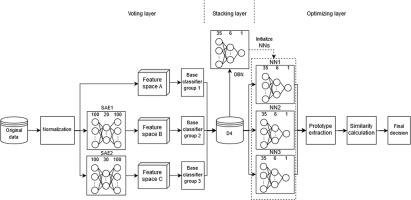当前位置:
X-MOL 学术
›
J. Biomed. Inform.
›
论文详情
Our official English website, www.x-mol.net, welcomes your
feedback! (Note: you will need to create a separate account there.)
Deep ensemble learning for Alzheimer's disease classification.
Journal of Biomedical informatics ( IF 4.0 ) Pub Date : 2020-03-29 , DOI: 10.1016/j.jbi.2020.103411 Ning An 1 , Huitong Ding 2 , Jiaoyun Yang 1 , Rhoda Au 3 , Ting F A Ang 4
Journal of Biomedical informatics ( IF 4.0 ) Pub Date : 2020-03-29 , DOI: 10.1016/j.jbi.2020.103411 Ning An 1 , Huitong Ding 2 , Jiaoyun Yang 1 , Rhoda Au 3 , Ting F A Ang 4
Affiliation

|
Ensemble learning uses multiple algorithms to obtain better predictive performance than any single one of its constituent algorithms could. With the growing popularity of deep learning technologies, researchers have started to ensemble these technologies for various purposes. Few, if any, however, have used the deep learning approach as a means to ensemble Alzheimer's disease classification algorithms. This paper presents a deep ensemble learning framework that aims to harness deep learning algorithms to integrate multisource data and tap the 'wisdom of experts'. At the voting layer, two sparse autoencoders are trained for feature learning to reduce the correlation of attributes and diversify the base classifiers ultimately. At the stacking layer, a nonlinear feature-weighted method based on a deep belief network is proposed to rank the base classifiers, which may violate the conditional independence. The neural network is used as a meta classifier. At the optimizing layer, over-sampling and threshold-moving are used to cope with the cost-sensitive problem. Optimized predictions are obtained based on an ensemble of probabilistic predictions by similarity calculation. The proposed deep ensemble learning framework is used for Alzheimer's disease classification. Experiments with the clinical dataset from National Alzheimer's Coordinating Center demonstrate that the classification accuracy of our proposed framework is 4% better than six well-known ensemble approaches, including the standard stacking algorithm as well. Adequate coverage of more accurate diagnostic services can be provided by utilizing the wisdom of averaged physicians. This paper points out a new way to boost the primary care of Alzheimer's disease from the view of machine learning.
中文翻译:

用于阿尔茨海默病分类的深度集成学习。
集成学习使用多种算法来获得比任何一种单一算法更好的预测性能。随着深度学习技术的日益普及,研究人员开始将这些技术整合用于各种目的。然而,很少有人使用深度学习方法来集成阿尔茨海默病分类算法。本文提出了一种深度集成学习框架,旨在利用深度学习算法来集成多源数据并挖掘“专家的智慧”。在投票层,训练两个稀疏自动编码器进行特征学习,以减少属性的相关性并最终使基分类器多样化。在堆叠层,提出了一种基于深度置信网络的非线性特征加权方法对基分类器进行排序,这可能违反条件独立性。神经网络用作元分类器。在优化层,使用过采样和阈值移动来应对成本敏感的问题。通过相似性计算,基于概率预测的集合获得优化的预测。所提出的深度集成学习框架用于阿尔茨海默病分类。对国家阿尔茨海默病协调中心的临床数据集进行的实验表明,我们提出的框架的分类精度比六种著名的集成方法(包括标准堆叠算法)高 4%。利用普通医生的智慧,可以提供充分覆盖、更准确的诊断服务。本文从机器学习的角度提出了促进阿尔茨海默病初级保健的新途径。
更新日期:2020-04-21
中文翻译:

用于阿尔茨海默病分类的深度集成学习。
集成学习使用多种算法来获得比任何一种单一算法更好的预测性能。随着深度学习技术的日益普及,研究人员开始将这些技术整合用于各种目的。然而,很少有人使用深度学习方法来集成阿尔茨海默病分类算法。本文提出了一种深度集成学习框架,旨在利用深度学习算法来集成多源数据并挖掘“专家的智慧”。在投票层,训练两个稀疏自动编码器进行特征学习,以减少属性的相关性并最终使基分类器多样化。在堆叠层,提出了一种基于深度置信网络的非线性特征加权方法对基分类器进行排序,这可能违反条件独立性。神经网络用作元分类器。在优化层,使用过采样和阈值移动来应对成本敏感的问题。通过相似性计算,基于概率预测的集合获得优化的预测。所提出的深度集成学习框架用于阿尔茨海默病分类。对国家阿尔茨海默病协调中心的临床数据集进行的实验表明,我们提出的框架的分类精度比六种著名的集成方法(包括标准堆叠算法)高 4%。利用普通医生的智慧,可以提供充分覆盖、更准确的诊断服务。本文从机器学习的角度提出了促进阿尔茨海默病初级保健的新途径。











































 京公网安备 11010802027423号
京公网安备 11010802027423号